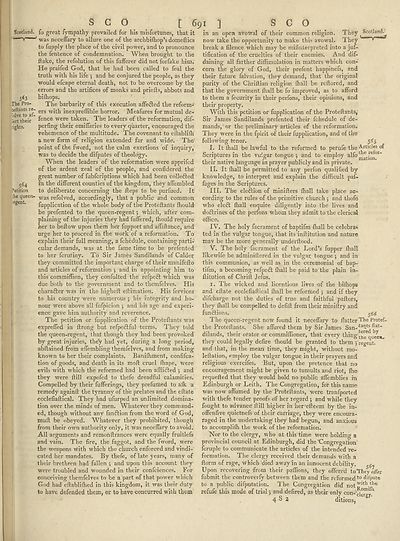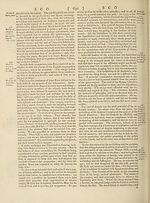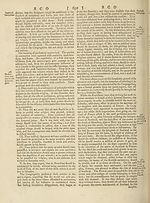Encyclopaedia Britannica, or, a Dictionary of arts, sciences, and miscellaneous literature : enlarged and improved. Illustrated with nearly six hundred engravings > Volume 18, RHI-SCR
(729) Page 691
Download files
Complete book:
Individual page:
Thumbnail gallery: Grid view | List view

SCO
Scotland.
5*3
The Pro-
tettants re-
'olve to af-
fert their
rights.
5*4
’etition
he queen-
egent.
fo great fympathy prevailed for his misfortunes, that it
was neceffary to allure one of the archbifliop’sdomeftics
to fupply the place of the civil power, and to pronounce
the fentence of condemnation. When brought to the
flake, the refolution of this fufferer did not forfake him.
He praifed God, that he had been called to feal the
truth with his life ; and he conjured the people, as they
would efcape eternal death, not to be overcome by the
errors and the artifices of monks and priefts, abbots and
bilhops.
The barbarity of this execution affe&ed the reform¬
ers with inexpreflible horror. Meafures for mutual de¬
fence were taken. The leaders of the reformation, dif-
perfing their emifiaries to every quarter, encouraged the
vehemence of the multitude. The covenant to efiablifli
a new form of religion extended far and wide. The'
point of the fword, not the calm exertions of inquiry,
was to decide the difputes of theology.
When the leaders of the reformation were apprifed
of the ardent zeal of the people, and confidered the
great number of fubfcriptions which had been collefted
in the different counties of the kingdom, they alfembled
to deliberate concerning the fleps to be purfued. It
was refolved, accordingly, that a public and common
fupplication of the whole body of the Proteftants fiiould
be prefented to the queen-regent; which, after com¬
plaining of the injuries they had fuffered, fhould require
her to bellow upon them her fupport and affiftance, and
urge her to proceed in the work of a reformation. To
explain their full meaning, a fchedule, containing parti¬
cular demands, was at the fame time to be prefented
to her fcrutiny. To Sir James Sandilands of Calder
they committed the important charge of their manifeflo
and articles of reformation •, and in appointing him to
this commiffion, they confulted the refpeft which was
due both to the government and to themfelves. His
character was in the higheft eftimation. His fervices
to his country were numerous ; his integrity and ho¬
nour were above all fufpicion 5 and his age and experi¬
ence gave him authority and reverence.
The petition or fupplication of the Proteflants wTas
expreffed in flrong but refpeftful terms. They told
the queen-regent, that though they had been provoked
by great injuries, they had yet, during a long period,
ahflained from affembling themfelves, and from making
known to her their complaints. Banifhment, confifca-
tion of goods, and death in its moft cruel fhape, were
evils with which the reformed had been affli&ed •, and
they were Hill expofed to thefe dreadful calamities.
Compelled by their fufferings, they prefumed to alk a
remedy againft the tyranny of the prelates and the eftate
ecclefiaftical. They had ufurped an unlimited domina¬
tion over the minds of men. Whatever they command¬
ed, though without any fanflion from the word of God,
muft be obeyed. Whatever they prohibited, though
from their own authority only, it was neceffary to avoid.
All arguments and remonftrances were equally fruitlefs
and vain. The fire, the faggot, and the fword, were
the weapons \vith which the church enforced and vindi¬
cated her mandates. By thefe, of late years, many of
their brethren had fallen ; and upon this account they
were troubled and wounded in their confciences. For
conceiving themfelves to be a part of that power which
God had eftablifhed in this kingdom, it was their duty
to have defended them, of to have eoncurred with them
[ 691 ]
SCO
Scotland.
in an open avowal of their common religion. They
now take the opportunity to make this avowal. They
break a filence which may be mifinterpreted into a juf-
tification of the cruelties of their enemies. And dif-
daining all farther diflimulation in matters which con¬
cern the glory of God, their prefent happinefs, and
their future falvation, they demand, that the original
purity of the Chriftian religion (hall be rellored, and
that the government {hall be fo improved, as to afford
to them a fecurity in their perfons, their opinions, and
their property.
With this petition or fupplication of the Proteftants,
Sir James Sandilands prefented their fchedule of de¬
mands,'or the preliminary articles of the reformation.
They were in the fpirit of their fupplication, and of the
following tenor. 555
I. It ihall be lawful to the reformed to perufe the Articles
Scriptures in the vulgar tongue ; and to employ alfo
their native language in prayer publicly and in private.
II. It fhall be permitted to any perfon qualified by
knowledge, to interpret and explain the difficult paf-
fages in the Scriptures.
III. The eleftion of minifters {hall take place ac¬
cording to the rules of the primitive church j and thofe
who ele£t ftiall enquire diligently into the lives and
doctrines of the perfons whom they admit to the clerical
office.
IV. The holy facrament of baptifm {hall be celebra*.
ted in the vulgar tongue, that its inftitution and nature
may be the more generally underftood.
V. The holy facrament of the Lord’s fupper {hall
likewife be adminiflered in the vulgar tongue j and in
this communion, as cvell as in the ceremonial of bap¬
tifm, a becoming refpedt {hall be paid to the plain in¬
ftitution of Chrift Jefus.
I. The wicked and licentious lives of the bifhops
and eftate ecclefiaftical {hall be reformed ; and if they
difcharge not the duties of true and faithful paftors,
they {hall be compelled to defift from their miniftry and
fun6lions.
The queen-regent now found it neceflary to flatter The Frotef-
the Proteftants. She aflured them by Sir James San-*a^t^a,:"
dilands, their orator or commiftioner, that every thing t^e qUeen„
they could legally defire ftiould be granted to them j regent,
and that, in the mean time, they might, without mo-
leftation, employ the vulgar tongue in their prayers and
religious exercifes. But, upon the pretence that no
encouragement might be given to tumults and riot, fhe
requefted that they would hold no public aflemblies in
Edinburgh or Leith. The Congregation, for this name
was now affumed by the Proteftants, were tranfported
with thefe tender proofs of her regard j and while they
fought to advance ftill higher in her efteem by the in-
offenfive quietnels of their carriage, they -were encoura-
raged in the undertaking they had begun, and anxious
to accomplifti the work of the reformation.
Nor to the clergy, who at this time were holding a
provincial council at Edinburgh, did the Congregation
fcruple to communicate the articles of the intended re¬
formation. The clergy received their demands with a
ftorm of rage, Which died away in an innocent debility. <.£_
Upon recovering from their paflions, they offered to They offer
fubmit the controverfy between them and the reformed10 difpute
to a public difputation. The Congregation did notw^.tlie
refufe this mode of trial 5 and defired, as their only con--^™y ‘
4^3 ditions,
Scotland.
5*3
The Pro-
tettants re-
'olve to af-
fert their
rights.
5*4
’etition
he queen-
egent.
fo great fympathy prevailed for his misfortunes, that it
was neceffary to allure one of the archbifliop’sdomeftics
to fupply the place of the civil power, and to pronounce
the fentence of condemnation. When brought to the
flake, the refolution of this fufferer did not forfake him.
He praifed God, that he had been called to feal the
truth with his life ; and he conjured the people, as they
would efcape eternal death, not to be overcome by the
errors and the artifices of monks and priefts, abbots and
bilhops.
The barbarity of this execution affe&ed the reform¬
ers with inexpreflible horror. Meafures for mutual de¬
fence were taken. The leaders of the reformation, dif-
perfing their emifiaries to every quarter, encouraged the
vehemence of the multitude. The covenant to efiablifli
a new form of religion extended far and wide. The'
point of the fword, not the calm exertions of inquiry,
was to decide the difputes of theology.
When the leaders of the reformation were apprifed
of the ardent zeal of the people, and confidered the
great number of fubfcriptions which had been collefted
in the different counties of the kingdom, they alfembled
to deliberate concerning the fleps to be purfued. It
was refolved, accordingly, that a public and common
fupplication of the whole body of the Proteftants fiiould
be prefented to the queen-regent; which, after com¬
plaining of the injuries they had fuffered, fhould require
her to bellow upon them her fupport and affiftance, and
urge her to proceed in the work of a reformation. To
explain their full meaning, a fchedule, containing parti¬
cular demands, was at the fame time to be prefented
to her fcrutiny. To Sir James Sandilands of Calder
they committed the important charge of their manifeflo
and articles of reformation •, and in appointing him to
this commiffion, they confulted the refpeft which was
due both to the government and to themfelves. His
character was in the higheft eftimation. His fervices
to his country were numerous ; his integrity and ho¬
nour were above all fufpicion 5 and his age and experi¬
ence gave him authority and reverence.
The petition or fupplication of the Proteflants wTas
expreffed in flrong but refpeftful terms. They told
the queen-regent, that though they had been provoked
by great injuries, they had yet, during a long period,
ahflained from affembling themfelves, and from making
known to her their complaints. Banifhment, confifca-
tion of goods, and death in its moft cruel fhape, were
evils with which the reformed had been affli&ed •, and
they were Hill expofed to thefe dreadful calamities.
Compelled by their fufferings, they prefumed to alk a
remedy againft the tyranny of the prelates and the eftate
ecclefiaftical. They had ufurped an unlimited domina¬
tion over the minds of men. Whatever they command¬
ed, though without any fanflion from the word of God,
muft be obeyed. Whatever they prohibited, though
from their own authority only, it was neceffary to avoid.
All arguments and remonftrances were equally fruitlefs
and vain. The fire, the faggot, and the fword, were
the weapons \vith which the church enforced and vindi¬
cated her mandates. By thefe, of late years, many of
their brethren had fallen ; and upon this account they
were troubled and wounded in their confciences. For
conceiving themfelves to be a part of that power which
God had eftablifhed in this kingdom, it was their duty
to have defended them, of to have eoncurred with them
[ 691 ]
SCO
Scotland.
in an open avowal of their common religion. They
now take the opportunity to make this avowal. They
break a filence which may be mifinterpreted into a juf-
tification of the cruelties of their enemies. And dif-
daining all farther diflimulation in matters which con¬
cern the glory of God, their prefent happinefs, and
their future falvation, they demand, that the original
purity of the Chriftian religion (hall be rellored, and
that the government {hall be fo improved, as to afford
to them a fecurity in their perfons, their opinions, and
their property.
With this petition or fupplication of the Proteftants,
Sir James Sandilands prefented their fchedule of de¬
mands,'or the preliminary articles of the reformation.
They were in the fpirit of their fupplication, and of the
following tenor. 555
I. It ihall be lawful to the reformed to perufe the Articles
Scriptures in the vulgar tongue ; and to employ alfo
their native language in prayer publicly and in private.
II. It fhall be permitted to any perfon qualified by
knowledge, to interpret and explain the difficult paf-
fages in the Scriptures.
III. The eleftion of minifters {hall take place ac¬
cording to the rules of the primitive church j and thofe
who ele£t ftiall enquire diligently into the lives and
doctrines of the perfons whom they admit to the clerical
office.
IV. The holy facrament of baptifm {hall be celebra*.
ted in the vulgar tongue, that its inftitution and nature
may be the more generally underftood.
V. The holy facrament of the Lord’s fupper {hall
likewife be adminiflered in the vulgar tongue j and in
this communion, as cvell as in the ceremonial of bap¬
tifm, a becoming refpedt {hall be paid to the plain in¬
ftitution of Chrift Jefus.
I. The wicked and licentious lives of the bifhops
and eftate ecclefiaftical {hall be reformed ; and if they
difcharge not the duties of true and faithful paftors,
they {hall be compelled to defift from their miniftry and
fun6lions.
The queen-regent now found it neceflary to flatter The Frotef-
the Proteftants. She aflured them by Sir James San-*a^t^a,:"
dilands, their orator or commiftioner, that every thing t^e qUeen„
they could legally defire ftiould be granted to them j regent,
and that, in the mean time, they might, without mo-
leftation, employ the vulgar tongue in their prayers and
religious exercifes. But, upon the pretence that no
encouragement might be given to tumults and riot, fhe
requefted that they would hold no public aflemblies in
Edinburgh or Leith. The Congregation, for this name
was now affumed by the Proteftants, were tranfported
with thefe tender proofs of her regard j and while they
fought to advance ftill higher in her efteem by the in-
offenfive quietnels of their carriage, they -were encoura-
raged in the undertaking they had begun, and anxious
to accomplifti the work of the reformation.
Nor to the clergy, who at this time were holding a
provincial council at Edinburgh, did the Congregation
fcruple to communicate the articles of the intended re¬
formation. The clergy received their demands with a
ftorm of rage, Which died away in an innocent debility. <.£_
Upon recovering from their paflions, they offered to They offer
fubmit the controverfy between them and the reformed10 difpute
to a public difputation. The Congregation did notw^.tlie
refufe this mode of trial 5 and defired, as their only con--^™y ‘
4^3 ditions,
Set display mode to:
![]() Universal Viewer |
Universal Viewer | ![]() Mirador |
Large image | Transcription
Mirador |
Large image | Transcription
Images and transcriptions on this page, including medium image downloads, may be used under the Creative Commons Attribution 4.0 International Licence unless otherwise stated. ![]()
| Permanent URL | https://digital.nls.uk/193028184 |
|---|
| Attribution and copyright: |
|
|---|
| Description | Ten editions of 'Encyclopaedia Britannica', issued from 1768-1903, in 231 volumes. Originally issued in 100 weekly parts (3 volumes) between 1768 and 1771 by publishers: Colin Macfarquhar and Andrew Bell (Edinburgh); editor: William Smellie: engraver: Andrew Bell. Expanded editions in the 19th century featured more volumes and contributions from leading experts in their fields. Managed and published in Edinburgh up to the 9th edition (25 volumes, from 1875-1889); the 10th edition (1902-1903) re-issued the 9th edition, with 11 supplementary volumes. |
|---|---|
| Additional NLS resources: |
|

